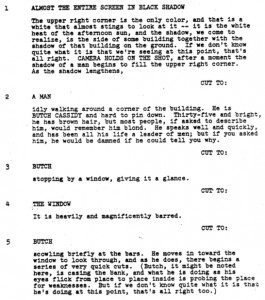Butch Cassidy and the Sundance Kid is William Goldman’s first original screenplay. A Western script written in the late-1960s, its style and format nevertheless has more in common with the continuities of the silent era than with other screenplays available from Goldman’s period. This may not be coincidence.
54 results for
Permanent link to this article: https://www.screenplayology.com/2011/09/01/review-butch-cassidy-and-the-sundance-kid-shooting-script-71568/
Aug 31
Cameron Crowe releases deleted and extended script scenes from ‘SAY ANYTHING…’
Over at his official website, Cameron Crowe helps us prove that screenplays are worth studying by releasing a series of deleted and extended script scenes from the final shooting script of Say Anything…, dated 1/18/88. Among the goodies: the only scene in which Lloyd Dobler utters the title of the movie.
Permanent link to this article: https://www.screenplayology.com/2011/08/31/cameron-crowe-releases-deleted-and-extended-script-scenes-from-say-anything/
Aug 28
Review: E.T.: The Extra-Terrestrial (Shooting Script: 9/8/81)
This draft of E.T.: The Extra-Terrestrial is an excellent starter script for beginners in screenplay studies. In many ways it is the quintessential shooting script, containing lots of revisions, added and omitted scenes, half-filled added pages, and a fair amount of technical comment.
Permanent link to this article: https://www.screenplayology.com/2011/08/28/review-e-t-the-extra-terrestrial-shooting-script-9881/
Aug 20
Notes on UFVA Presentation
I recently traveled to Boston in order to attend the annual University of Film and Video Association conference, where I offered a presentation called “Teaching the Digital Screenplay and Its Role in Conception and Execution.” The presentation was well-received, and I’m in the process of developing it into a formal paper I hope to publish. …
Permanent link to this article: https://www.screenplayology.com/2011/08/20/notes-on-ufva-presentation/
Aug 20
Revisions Complete … Mostly
I’m happy to report that the reorganization of the site is, for the most part, completed. The site still has some issues, especially navigationally, with several dead links that need to be fixed, but for the most part, users should not find it too difficult to get around. The next big project is updating and …
Permanent link to this article: https://www.screenplayology.com/2011/08/20/revisions-complete-mostly/
2.3. narratology
Narratology is the theory of narratives, narrative texts, images, spectacles, events; cultural artifacts that ‘tell a story.’” — Mieke Bal1 2.3.1. Overview. Narratology approaches narrative as a system of working parts that can be broken apart, analyzed, and described. Its primary focus is the relationship between story and discourse (plot, narration, and focalization). As a …
Permanent link to this article: https://www.screenplayology.com/content-sections/paths-problems-in-screenplay-studies/3-3-narratology/
content sections
Here you will find an in-depth guide to the numerous issues encountered in screenplay studies.
Permanent link to this article: https://www.screenplayology.com/content-sections/
Permanent link to this article: https://www.screenplayology.com/blog/
home
Note: Screenplayology has not been updated in several years. Nevertheless, I am pleased that many teachers and students continue to discover it and use it in their studies. What is Screenplayology? While the screenplay, in some form, has been the foundation of most narrative cinema in the U.S. for nearly 100 years, it has been …
Permanent link to this article: https://www.screenplayology.com/
3.2. alternative screenplay structure
Nothing is more central to the manuals than their structural approach to screenplays, in particular, the importance of the three-act paradigm.” — J.J. Murphy1 Outside of the world of film, many possible contributory factors might have helped shape this surging trend in unconventional narration: the fragmenting ‘postmodern condition’ and its revolt against master narratives; the …
Permanent link to this article: https://www.screenplayology.com/content-sections/screenplay-form-content/3-2/

